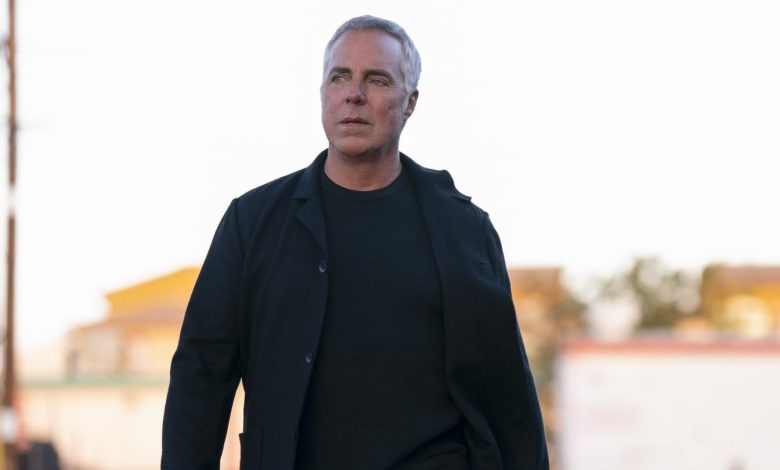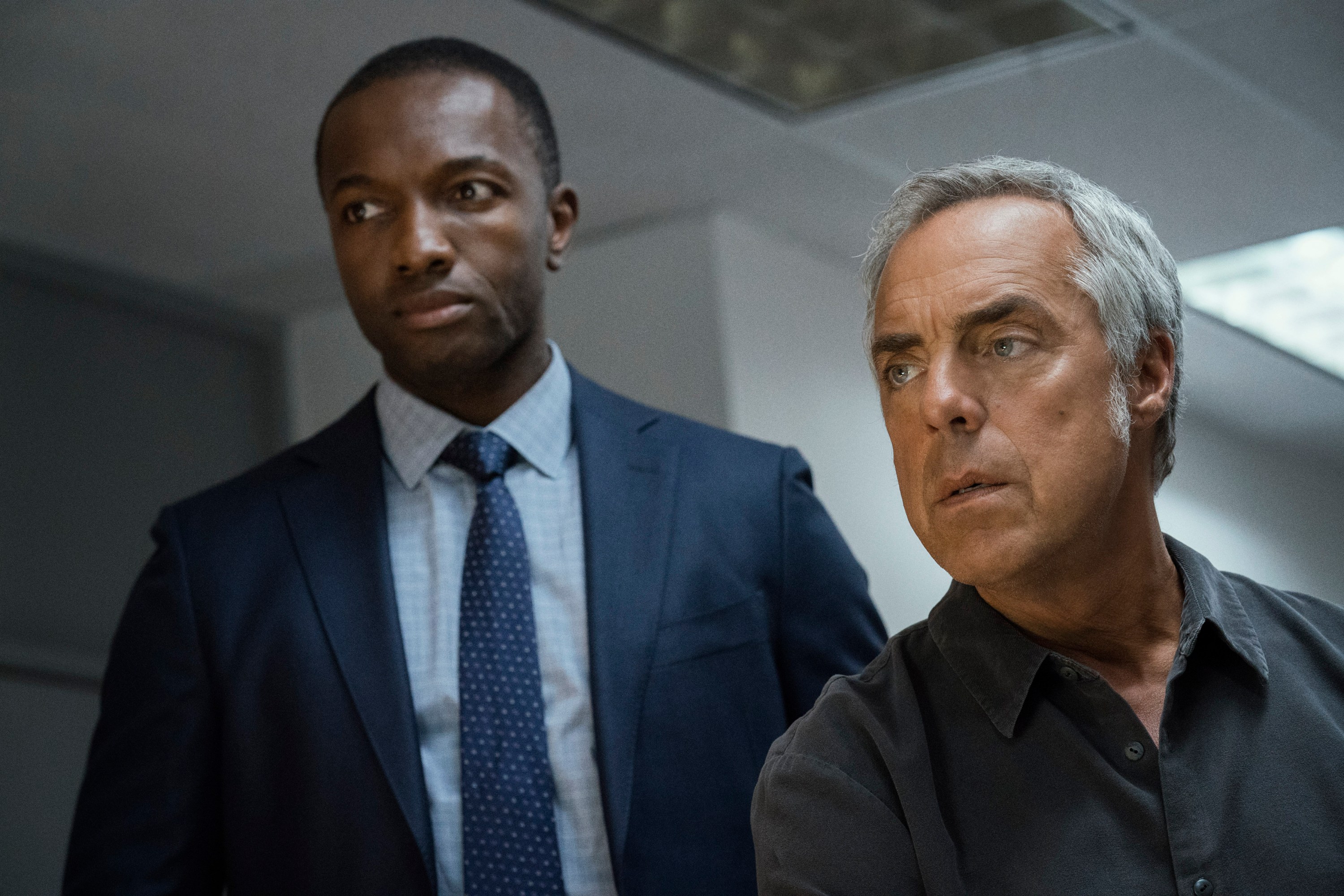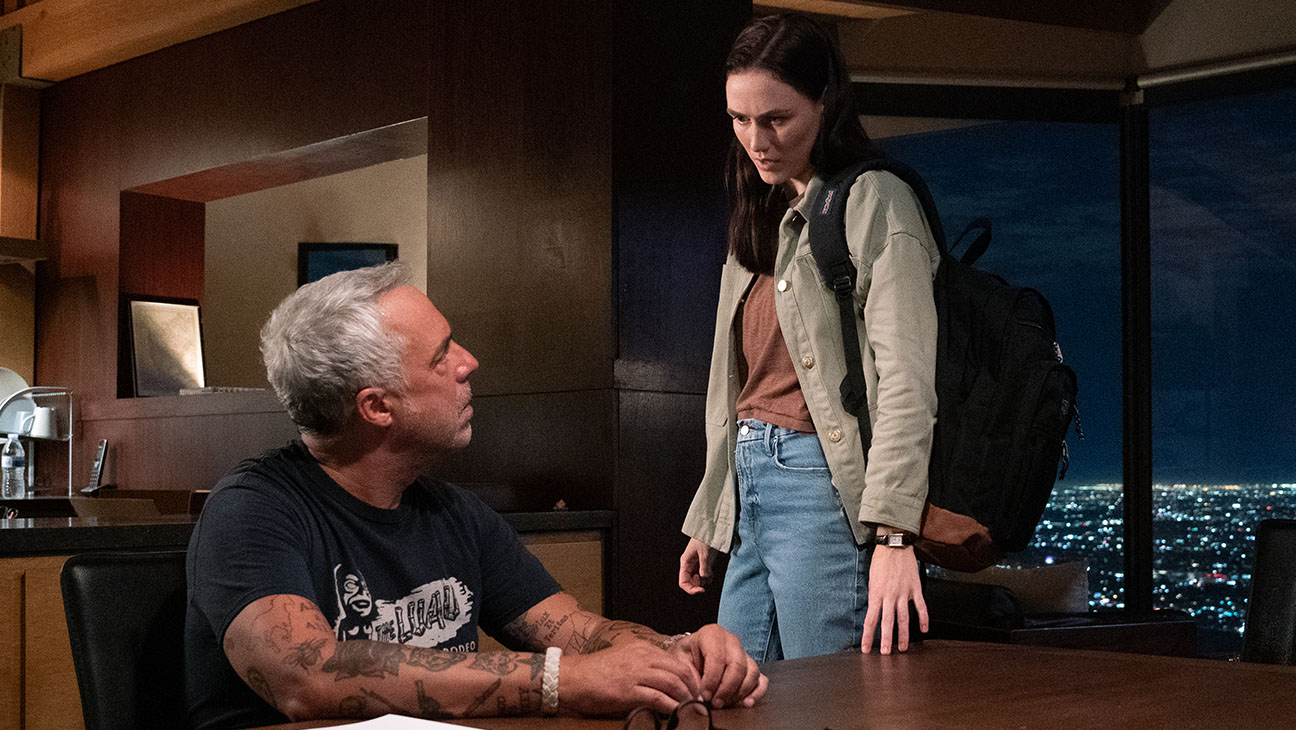Titus Welliver on Bosch Cancellation and Future

Titus Welliver believes in fate. Several years ago, when it was decided that internationally known author and novelist Michael Connelly’s LAPD Detective Harry Bosch would be brought to life in a streaming series for Amazon, Welliver felt deep down that he would be the perfect actor to leap the character off the page.
Connelly and his fellow executive producers ultimately saw the vision that Williver pitched with his Bosch, a casting decision that would parlay into his Bosch becoming the longest-running streaming character to date. After starring on Bosch for seven seasons, Bosch: Legacy has now returned with its third and final season, and other franchise spinoffs on the horizon.
اRelated Posts:
But with Bosch: Legacy now streaming its first four episodes to adoring fans, it’s a beginning of the end for Williver and his Bosch. Prime Video announced last September, much to the disgruntlement of the large and faithful fanbase, that Bosch: Legacy would end with season three. Turns out, that news was surprising to Williver and Connelly as well, and the latter promised to bring a “fitting close” to the actor’s 10-season run as the titular character.
“We’d already been in conversations midway towards the end of the season talking about the next season and ideas [for season four], and we were getting very excited about the prospect,” says Williver, who has a first-look series deal with Amazon MGM Studios. “I got a call from them and they said they’re not going forward. It was a pretty brief conversation. We all expressed our disappointment, but we’ve all been doing this long enough to know that could happen.”
Welliver, in conversation with The Hollywood Reporter below, begins to say goodbye to a character he says he’s related to more than any other character he’s portrayed across his more than 30-year career. With Bosch now retired from the LAPD and working as a private investigator, Welliver reflects on his Bosch legacy while ushering in the new season and sharing how the finale will help launch the next show in the franchise canon, the Renée Ballard spinoff. Welliver also goes inside the talks with Amazon to end the show and offers this about a possible future: “I would not be shocked if at some point there was a revisitation.”
***
Bosch didn’t just resonate with viewers who love a police detective show. The series also became a hit with music lovers, especially those deep into jazz. Do you and Bosch have that love for jazz in common?
I’m a jazz lover, but when I met Michael Connolly, who has an encyclopedic knowledge of jazz, he turned me on to so much more. I grew up in a household where both my parents were huge jazz fans. They loved all music. There was always music playing in our house, and my father was friends with a lot of jazz greats — Miles Davis, [Charles] Mingus, [Thelonious] Monk — he knew all those cats. He knew [John] Coltrane too, but I got to meet Mingus and meet Miles as a kid.
But Michael would say, “Have you ever heard this recording, Stockholm Sweden, 1956?” Now they’re re-releasing a lot of this stuff on these super high grain-quality vinyl. They’re like $150; some of them would go up to $200. But they’re all from the original analog recordings and stuff. So yes, I’m a purist like Harry, man. I know stuff can sound really great on the high-quality CDs, but there’s nothing like listening to something on vinyl with a good system. It doesn’t even have to be a great system; it’s just the bottoms and the highs, everything is the way it was supposed to be heard. And then, being of a generation growing up in the ‘60s, we didn’t have CDs or anything like that; so, it sounds the way that it’s supposed to sound.
Besides a love for jazz, what are other similarities between you and Bosch?
As a visual artist, because I’m also a painter, I’m always in a state of observation. I’m always looking at light, and how it reflects off of a building or a tree, or what it does to the ground at different times of the day. As an actor, I’m always observing people — behavioral stuff, gestures, mannerisms. There would be times where I would see some cat that I would bump into in the subway who would have something that is interesting, I would be like, “I’ll put that in my catalog. I’m going to find a character at some point where I will be able to use that.”
Similarly, Harry Bosch as a detective is in a constant state of observation, and it’s not just purely from a point of detecting danger, but he does the same thing. He looks at people, he reads people, he reads the environment. He studies crime scenes. Those are the observational qualities that I share with Harry Bosch. When you grow up in a city, you do have to be on point. Your Spidey sense goes off, that usually means something’s about to jump off. I think I share that with him.
You have spoken about this briefly, but how does Amazon come to the Bosch production team — for a flagship series with seemingly no diminishing fanbase — and say that it’s time to end Bosch: Legacy?
Ultimately, like Harry would say, I too am not necessarily a political or administrative animal. I am an artist. So, I got the call, actually, from Michael Connelly and one of our producers, Henrik Bastin, because we’d already been in conversations midway towards the end of the season talking about the next season and ideas, and we were getting very excited about the prospect of that. I got a call from them and they said they’re not going forward. It was a pretty brief conversation. We all expressed our disappointment, but we’ve all been doing this long enough to know that could happen.
I mean, if you consider certainly within the realm of network television, you’ll find a show and you’ll get into it, and five or six episodes in, that show gets canceled. You’re like “Wait! Hold up a minute, what happened?” Sometimes it’s a myriad of reasons that I don’t necessarily understand. I do understand that given the economy and things like that, there are a lot of studios that have been experiencing budgetary restrictions. But, as far as that, I’ve never had a conversation where I sat down and said, “Alright, tell me from point A to point B what it’s based on.”
That being said, I have a decade long business relationship and personal relationship with Amazon Studios from the early inception of them getting into the entertainment business. I have a first-look development deal with Amazon. My business relationship with them continues outside of Bosch. And, you never know in Hollywood. I would not be shocked if at some point there was a revisitation. We all have to continue with our lives. But if the fans have anything to say about it… and they are very clear about their feelings!

There is a spinoff that will materialize not long after the final curtain of Bosch, Ballard.
The Renée Ballard spinoff series, yes. In one of the last episodes of this final season, we introduce the character of Renée Ballard, played brilliantly by Maggie Q. That’s a relationship that exists within the books. She’s younger than Harry is. They cross paths and in the books, because obviously, you’ve got more time and there has been several books written with the two of them working together, they forge a relationship. He becomes kind of a mentor to her, and she also grants him access to stuff that he wouldn’t normally be able to get because he’s no longer a cop. He has sort of paternal feelings for her. It’s a beautifully realized relationship in the books. Now, in 45 or 50 minutes of an episode you can only do so much, but Maggie and I had really good chemistry. We fast became friends, and I think the introduction to her character is really really strong, and it’s rooted in the Bosch cannons.
It seems like there are always three or four storylines going on simultaneously in Bosch: Legacy. Has that always been the pattern or thread throughout the franchise?
That’s the way we’ve always done it, because we would pick a book or two books sometimes and combine them. Then there were certain aspects of those storylines we would have to change, and then you would also have writers, at the same time, organically creating other subplots for the show, relating to other characters. A lot of the characters on the show — like Honey Chandler (Mimi Rogers), to my recollection, I think she’s only in a couple of books. Same with the late great Lance Reddick. His character, Irvin Irving, was in a few books. So, there are a lot of things that were there. We elongated those relationships and made them a regular part of the show.
There has always been the A-plot, which is Harry catching the case and working the case, and then there’s stuff going on with his daughter. You have stuff going on with Irvin [Rerddick]. And then you have stuff going on with his partner Jerry Edgar, played by my main man Jamie Hector, which meant that the writers would extrapolate and then create other storylines for them. We had a lot of fun doing that, when it really became about their partnership.
The other part that really became the core of it was when Harry became reacquainted with his daughter, Maddie (Madison Lintz). She came to live with him, was in L.A. and then subsequently she becomes a cop. It informed some of the emotional evolution of Bosch’s character, because he’s not monosyllabic but he’s not a guy who talks a lot. He’s certainly not an emotionally demonstrative character at all. He is internalized, he’s not showing you anything. And the only time he does expose himself, even with some reluctance, is with his daughter.
Speaking of Bosch’s daughter, we see in the first four episodes of Bosch: Legacy that there is this disconnection or mistrust of Harry by Maddie. It seems that, with all this father and daughter have gone through, this may be the time she has the biggest questions about his code of honor. Can you dig into that storyline?
Yes, because it doesn’t necessarily spoil anything. First of all, there’s the whole Preston Borders thing [the character played by Chris Browning, who was a rapist and murderer that Bosch arrested and sent to prison in 1987, but who now makes a collect call to Bosch at the end of season two to say he has killed Maddie’s kidnapper in prison, as allegedly ordered by Bosch. Maddie receives the call].
When we come into season three, eight months have transpired. That’s still in the air, but what also happens is that they start to conduct an investigation into Harry. Did he really order or parlay some kind of way for this Dockweiler character [David Denman] to be killed for kidnapping his daughter? Because we saw him go into the room with the pen [in season two, where Bosch threatens to stab his daughter’s kidnaper’s eyes out], and J. Edgar came in at the right time. People ask me that question often: “Do you think Harry would kill him?” I was like, “Well, if he didn’t get his daughter back, I think you’d have a very different ending.” But in that moment, he’s definitely ready to visit violence upon this guy to find out where his daughter is; so, we know the fabric of Harry’s character.
It’s one thing if you come after Harry, which is also the device that was very helpful to us once we brought that Maddie relationship back. That was originally supposed to be just for one season. But the great thing that Connelly said, “It’s one thing when Harry is on his own, but now that he has his daughter in his life, he could be gotten to.” That makes him vulnerable, and anything that makes Harry vulnerable makes him significantly more dangerous. But there is a process that occurs throughout this season where Maddie is confused. She’s like, “There’s stuff that I now know about my dad and his time in military service he never talks about.” She is told this story by one of the guys from his team in the Special Forces about when they were in Afghanistan. She has a deeper understanding of her father, but is also ultimately able to process the fact that these things that occurred were in in wartime, which is very different. The Harry that works the streets of LAPD is not the same Bosch who was a combat veteran.

What are some of your overall memories about the 10 years you’ve portrayed Harry Bosch? And what will you take with you as this may be the end of seeing his story being told in such great detail?
In the very beginning for me, reading the script and feeling very connected and thinking to myself, “I really know who this guy is, and I know how to play him.” But also, having been in this business as long as I have, not wanting to want it too much. Because I was so magnetized to the character. I just thought, “Well, they’re going to go out to every big Hollywood star name they can get.” It’s not like I didn’t have a body of work. It’s not that I didn’t take it seriously. Then through a series of mishaps, I was shooting one of the Transformers films, which had me all over the country and then in Hong Kong, the meetings weren’t happening. It was months later I got a call, where I had a furlough from Hong Kong and was able to be back in the states. My manager called me and said, “You’re going to meet with Michael Connelly. And I went, “Bosch?” and he said yes. I was like, “What’s happening, I thought that boat sailed?” He said, “No, they haven’t found Bosch. Michael Connelly has approval of who’s going to play Bosch and they’ve been trying to get together with you for all these months.”
So, it is one of those true happy ending stories were where I went in and Michael Connelly and the other producers felt that I was the character, and so I got the gig. But the process of making this show for all these years was really collaborative, rather than feeling like standard fare of certain elements of television. It was elevated. It felt like art. There was nothing standardized about it at all. The cinematography was really that, it was shot like a feature film.
And the many great directors that I got to work with — Ernest Dickerson, Patrick Cady, Alex Zakrzewski, Jet Wilkinson — it’s just an absolute treasure trove of wonderful directors, actors, producers and guest actors. We forged a true unity like a family when you work together so long. I think the quality of the material attracted a lot of very recognizable actors because they saw an opportunity to really do some work on something that was substantive. I’ll miss that because I can say in complete honesty that despite the fact that there were times where I was getting up at 3 a.m. on a Monday, because we had a full day and we start earlier at the beginning of the week, I went to work with a smile on my face. I realized how truly blessed I was to be able to not only embody this character, but the people that I got to work with, it’s just been an amazing experience. And also, the goodwill towards the show. The fanbase has been incredibly dedicated from day one.
Michael Connolly, his books are global and hugely successful. He’s one of the most prolific and respected masters of the genre, and as a writer in general. He’s also one of the kindest, most beautiful human beings I know. So, that’s what I miss — that daily gratification of getting to be this cat and work with these people who I have deep affection for.
But I have to stay busy. No rest for the wicked, as they like to say. I have several movies coming out this year. I have stuff cooking in the witches’ brew with Amazon.
***
Bosch: Legacy releases two new episodes Thursdays on Prime Video, leading up to the April 17 series finale.
Source: Hollywoodreporter





